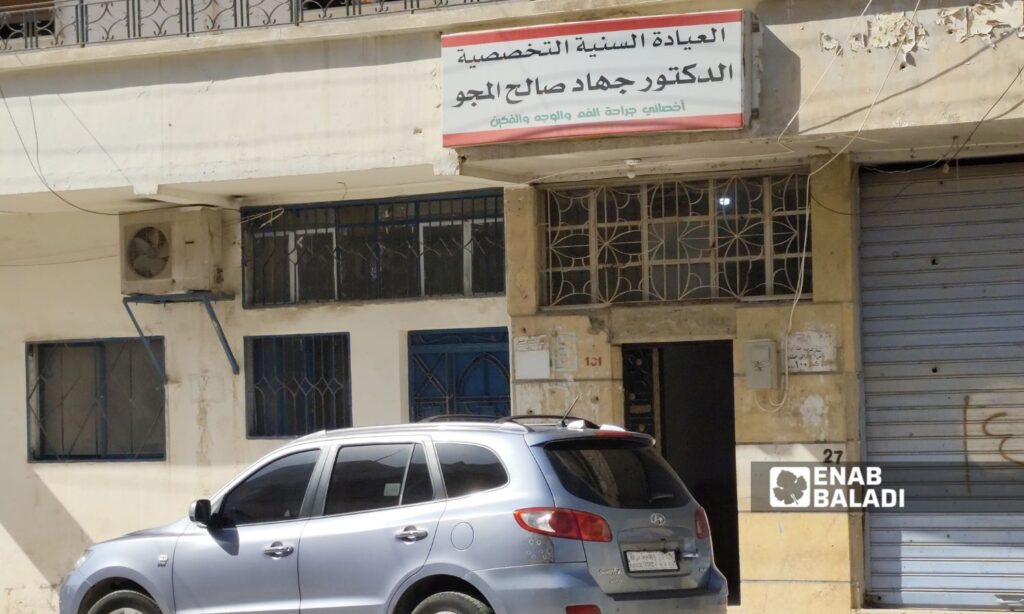Enab Baladi – Ras al-Ain
Patients in the city of Ras al-Ain, northwest of al-Hasakah, complain about the high costs of dental treatment, which impose a financial burden on their access to necessary health care.
The currency used in the city is the Syrian pound, but dental treatment costs are set in US dollars, ranging between $50 (750,000 Syrian pounds) and $150, depending on the number of damaged teeth.
The treatment fees are high compared to the living conditions of the residents, with daily wages ranging between 80,000 and 100,000 Syrian pounds. As a result, many people are forced to ignore their pain or resort to less expensive options, despite the health risks involved.
Postponing treatment or traditional extraction
Khaled Malik had to postpone the idea of treating his teeth, enduring his pain after visiting the dentist, who informed him that he needed to fill a broken tooth and asked for $55 for the treatment.
Malik works in the Ras al-Ain market, and his income is insufficient to cover his family’s daily expenses. He told Enab Baladi that he feels helpless in the face of the cost, adding that his children also need treatment. However, with these fees, he is forced to delay their care until he can afford it.
Similarly, Leila Murad, from Ras al-Ain, said she visited a dentist and discovered that she needed to install a missing tooth. The dentist asked her to pay $80 for the procedure.
She added to Enab Baladi that she was unable to secure the required amount and postponed the treatment until her financial situation improves.
Samer Faisal, a resident of Alouk village near Ras al-Ain, decided to visit the local hospital to seek treatment for his teeth but faced significant difficulties in accessing the service.
He stated to Enab Baladi that he was surprised by the heavy congestion when he arrived and that after a long wait, he finally managed to receive some treatment, but he could not complete it due to the heavy pressure on the hospital staff.
Many people opt to extract damaged teeth instead of treating them due to the high costs of treatment and their inability to bear the expenses.
According to Enab Baladi‘s correspondent, some residents rely on “traditional” treatment, as a few itinerant Bedouins perform tooth installations and extractions at prices much lower than those charged by private clinics.
Imported materials in dollars
The rise and fall of dental treatment material prices are influenced by the exchange rate of the dollar against the Syrian pound, as the raw materials are imported, along with the continuous rise in manufacturing equipment prices.
Dentist Marwan al-Ali in Ras al-Ain stated to Enab Baladi that dental treatment costs rise due to several factors, the most significant being the high prices of materials used in treatments.
Among these materials are cosmetic fillings, which are used to treat cavities and restore the appearance of teeth. These are imported materials that are directly affected by the dollar’s exchange rate, according to the doctor.
He added that the cost of importing these materials represents a burden on dentists, as it includes customs fees and transportation, leading to increased prices.
The cost of anesthetic materials, which are used to ensure the patient’s comfort during treatment, has also significantly increased, contributing to the overall rise in treatment costs. He pointed out that the prices of manufacturing equipment, such as X-ray machines and drilling tools, are continuously rising.
The doctor noted that other materials, such as crowns and bridges, require advanced manufacturing techniques, which also affects the prices.
He stressed the importance of early dental treatment before problems escalate, as delaying treatment leads to increased costs.
Free treatment at the hospital
A source from the Health Directorate in Ras al-Ain (who requested anonymity) stated that the National Hospital provides dental treatment services to dozens of patients in the area free of charge.
He explained that the significant pressure on the hospital has prompted some dentists to inflate dental treatment prices, which the directorate considers unacceptable.
The source added that the hospital provides two specialized dentists who work throughout the week, treating between 70 and 150 patients weekly without any costs.
He mentioned that the directorate intends to impose regulations to determine dental treatment costs among dentists so that they align with individual income, ensuring they do not lead to losses for the doctors.
Fragile medical sector
The National Hospital in Ras al-Ain, which is considered the primary healthcare facility for the city’s residents, faces challenges related to weak medical staff and a shortage of certain specialties, along with significant pressure it experiences.
Compared to northern Aleppo areas, Ras al-Ain faces acute shortages in support and lives under conditions resembling “siege and isolation,” which hinders efforts to provide necessary support for the medical sector.
In a previous report by Enab Baladi, it was mentioned that there are no ophthalmologists in Ras al-Ain, which constitutes a burden for patients in need of initial examinations or surgical operations.
Eye patients in the city are forced to look for doctors outside the area, whether by attempting to travel to Turkey or going to the nearby city of Tal Abyad (about 120 kilometers away).
Additionally, most residents in Ras al-Ain resort directly to the pharmacy to diagnose certain ailments and obtain medications that reduce pain and assist in treatment, despite the risks involved due to incorrect diagnoses and improper medications.
Ras al-Ain is located in the north of the al-Hasakah governorate, adjacent to the Turkish border, and is controlled by the Syrian National Army (SNA), supported by Turkey, while the Syrian Democratic Forces (SDF) control all adjacent areas, making its only outlet the Turkish border.

